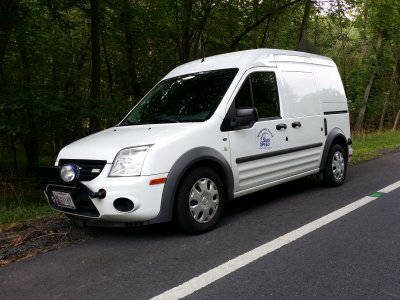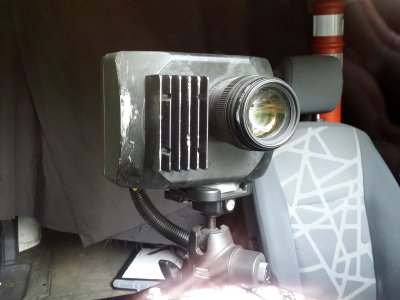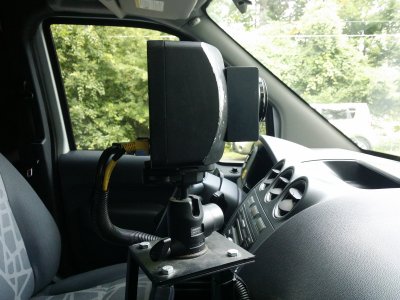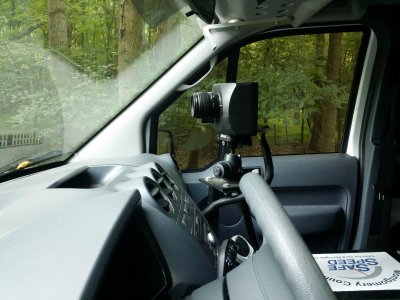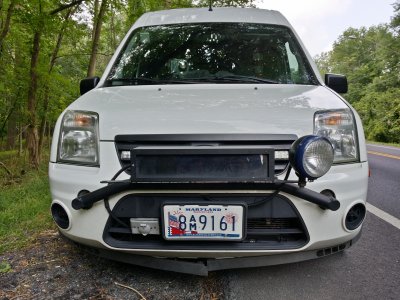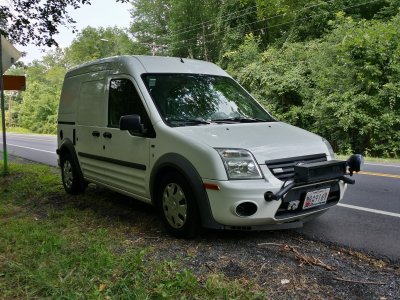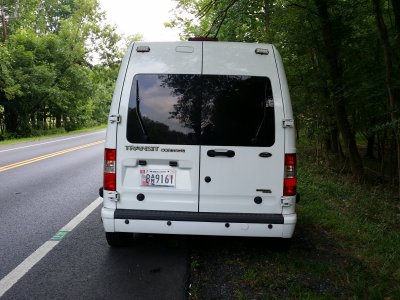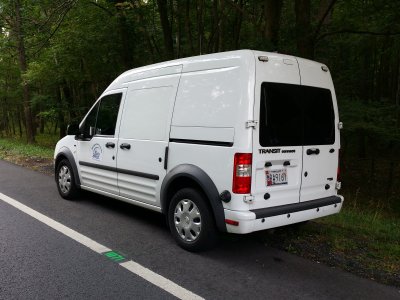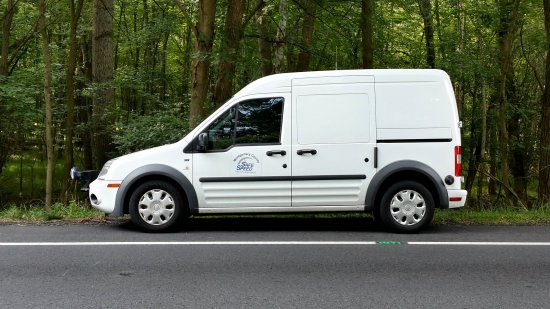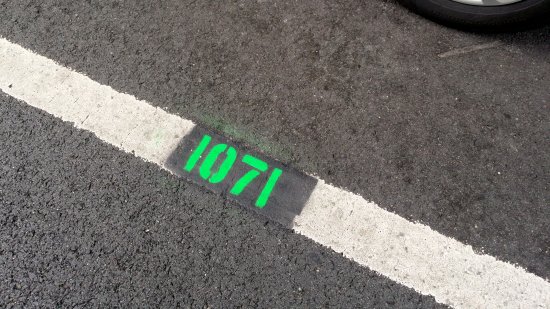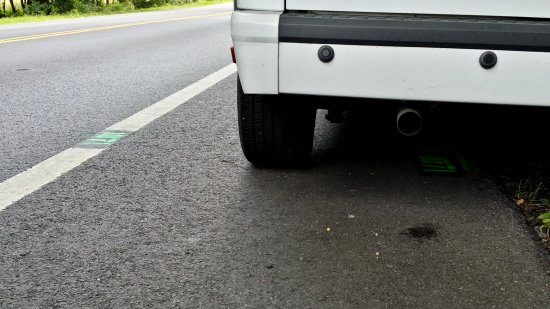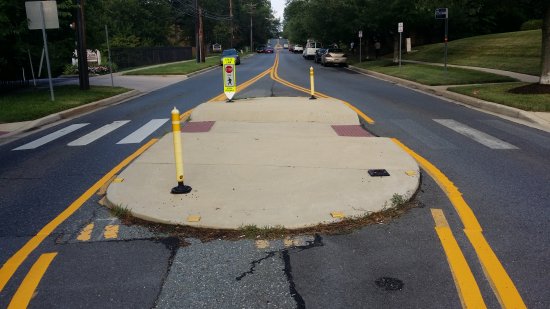The speed van…
6 minute read
July 29, 2015, 9:04 PM
While I was out yesterday, I spotted this van parked on the side of Bonifant Road in Greater Silver Spring (Colesville) near the Trolley Museum and the Intercounty Connector bridge:
This is a white Ford Transit Connect van, with the “Montgomery County Safe Speed” logo on the driver’s side door. This struck me as something that merited further investigation, because the county has been using Bonifant Road to raise revenue through speed enforcement for years. I’ve seen police sitting on the road, and there have been fixed speed camera boxes in various places along this road over the years.
So I checked it out. I peeked in the window, and there was the camera:
There was also this device on the front of the vehicle:
I don’t know specifically what this bumper-mounted device does, but considering the light on it, I suspect that it’s part of the speed-enforcement unit.
And then here are a few more views of the van:
Then there were these markings on the pavement near the van’s rear tires:
I have also seen similar markings painted directly onto the fixed speed camera boxes, near the bottom. I do not know exactly what these numbers mean, but my best guess is that these are identifiers for camera locations.
In any case, be on the lookout for these sorts of vehicles parked on the side of the road when driving in Montgomery County. They contain camera equipment, and exist for the purpose of separating you from your $40.
Now in the case of Bonifant Road, it runs east-west for 2.4 miles between Layhill Road and New Hampshire Avenue, and is one of several names carried by a much longer road (it begins as Emory Lane, becomes Bel Pre Road at Norbeck Road, becomes Bonifant Road at Layhill Road, and changes to Good Hope Road at New Hampshire Avenue, ending at Route 198), it is two lanes for almost its entire length, has relatively wide shoulders, and has many long, straight sections separated by very gentle curves. The speed limit is 35 mph for its entire length. Considering the amount of speed enforcement that I’ve seen, I would suggest that the problem is the speed limit itself more than drivers’ driving too fast along the road, and the county has chosen to exploit this problem to raise revenue rather than instituting a permanent fix for the problem. I usually end up driving this road in my car about once a week, when I’m going to destinations northeast of me. The speed cameras activate at 12 mph over, and I see most drivers going about 45 mph except around the cameras, where they drop down to 35 until they’re out of range, and then resume the faster speed.
My opinion is that a speed limit should fit the road. Thus exceeding a speed limit should cause the driver to genuinely feel as if they are moving at unsafe speed. If you can speed on a road and not realize that you are speeding until you look down at your speedometer, then the speed limit is set too low for the road. At the same time, if the authority having jurisdiction over a road wants drivers to slow down, then it should be done by modifying the road to make drivers do this naturally. There is a term for this: traffic calming. I’m not in favor of speed enforcement by any means, but I’m all for traffic calming.
For those not familiar, traffic calming takes the form of physical measures designed to make drivers travel more slowly, and increase bicycle and pedestrian safety. Here’s an example of traffic calming on my street:
This was one of three islands that were added to the street in late 2010. Stops for Ride On’s 51 bus were relocated to coincide with these islands. These served two purposes: to slow down traffic by narrowing the street, and to provide a safer way for bus riders to cross the street by providing the island as a refuge, plus crosswalks to mark where to expect pedestrians. I used to comment that when I worked in Dupont Circle, the two most dangerous parts of my commute were crossing Massachusetts Avenue at its intersection with Dupont Circle, and crossing the street where I live. This eliminated that danger area. I greatly appreciated the safer crossing, and I also tried, late at night, to see if it was possible to navigate through this area at the road’s posted speed limit of 30 mph in the car. It turns out that you can, but it’s a little too tight to do so comfortably. Seems that the island was successful in its mission.
And it’s not more speed humps, which I absolutely can’t stand. Even more so after I went over this speed bump a little bit too quickly in the bus during training, nearly throwing the training instructor into the floor.
Here’s another example, from Route 198, near Burtonsville:
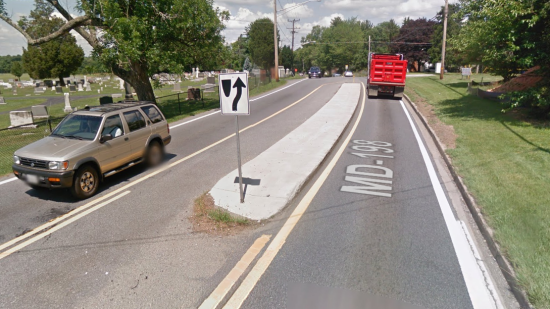
Image: Google Street View
This island is not for pedestrians, but rather, it serves to slow traffic down going west on Route 198. The speed limit through here is 40 mph, but very few people actually go that slowly. 50 is closer to what people actually do in this area. However, going through that stretch of westbound 198, you can’t help but slow down, because that stretch of roadway is narrow. Note the way the truck in the picture above more or less just fits through that area. You will slow down through here, not for fear of getting a ticket, but rather so as not to damage your own vehicle.
And that last point is exactly the idea behind traffic calming. You will slow down to the desired speed because you can’t safely go any faster due to the road conditions. If you try to go faster, you will cause an accident. Of course, the only problem with traffic calming is that these measures don’t raise money like speed enforcement does. Traffic calming is a permanent solution to the problem, but it costs money to implement, and then doesn’t provide a nice revenue stream after it’s been implemented.
You do, however, have to hand it to Maryland with the way they’ve handled automated speed enforcement. The fine for a camera ticket is $40. That’s enough to annoy you, but not enough to make you contest the camera ticket, especially since it comes with no points on your license. On the two occasions when I’ve gotten nailed by a speed camera (once each in 2011 and 2014), I paid the fine online just like I would any other bill, figuring that they needed that $40 a lot more than I did.
So please keep an eye out for these vans, and drive safely.
Categories: Driving, Silver Spring










